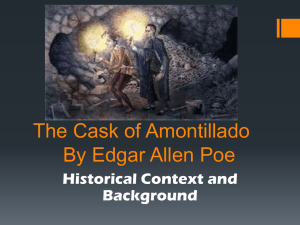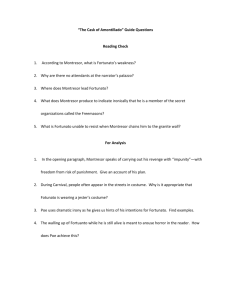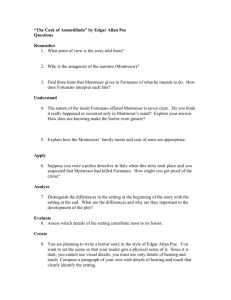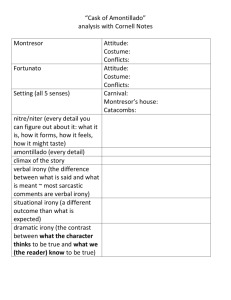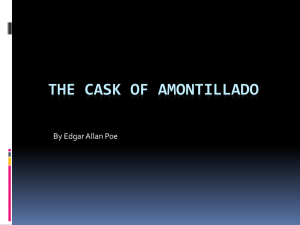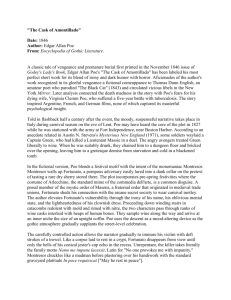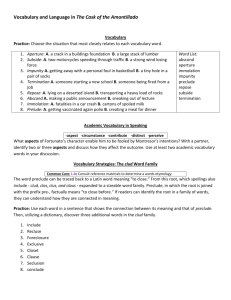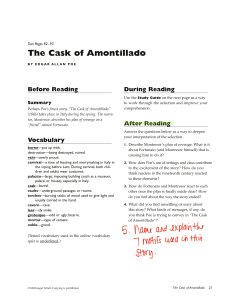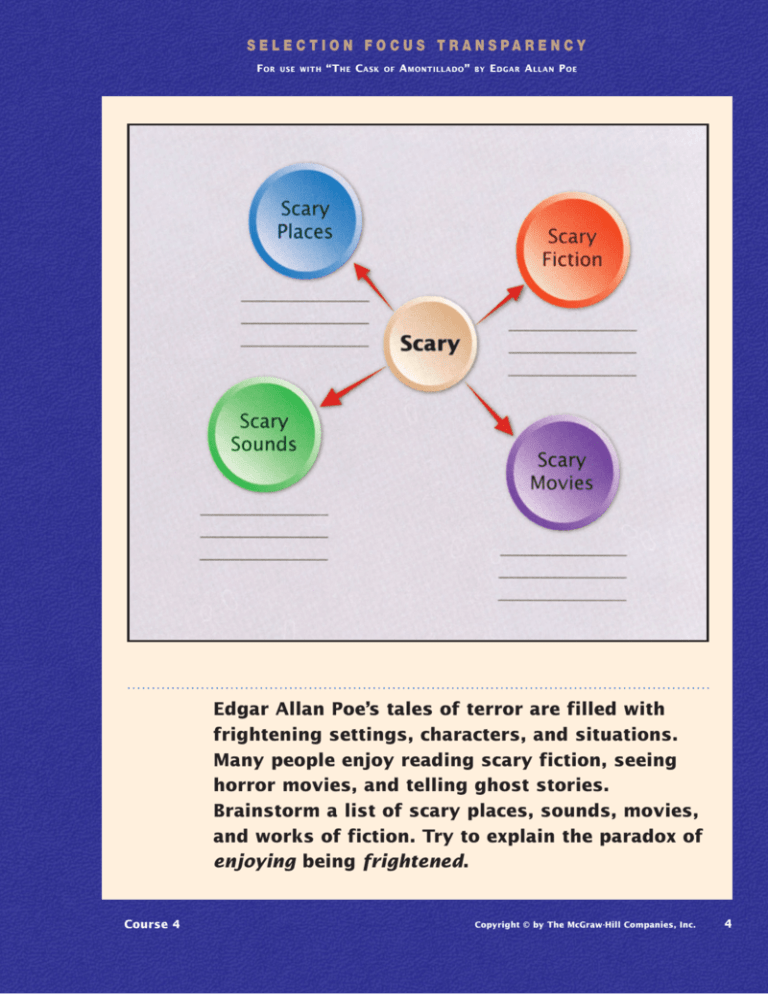
S E L E C T I O N F O C U S T R A N S PA R E N C Y
F OR
USE WITH
“T HE C ASK
OF
A MONTILLADO ”
BY
E DGAR A LLAN P OE
Edgar Allan Poe’s tales of terror are filled with
frightening settings, characters, and situations.
Many people enjoy reading scary fiction, seeing
horror movies, and telling ghost stories.
Brainstorm a list of scary places, sounds, movies,
and works of fiction. Try to explain the paradox of
enjoying being frightened.
Course 4
Copyright © by The McGraw-Hill Companies, Inc.
4
Before Reading
The Cask of Amontillado
Video link at
thinkcentral.com
Short Story by Edgar Allan Poe
VIDEO TRAILER
KEYWORD: HML9-370
Is REVENGE
ever justified?
RL 1 Cite textual evidence to
support analysis of what the
text says explicitly as well as
inferences drawn from the
text. RL 4 Analyze the cumulative
impact of specific word choices on
meaning and tone. RL 5 Analyze
how an author’s choices
concerning how to structure a
text create tension or surprise.
L 4 Determine the meaning of
unknown and multiple-meaning
words and phrases.
370
Montresor, the narrator of “The Cask of Amontillado,”
feels that revenge is necessary to right a wrong. Some
would argue that two wrongs never make a right and
that revenge leads only to more wrongdoing. Do acts of
revenge ever resolve conflicts?
PRESENT An act of revenge often causes a chain reaction,
and the repercussions can go on for months or years.
With a group, think of one act of revenge and chart out
the possible chain of effects. Share your chain of events
with the rest of the class.
Event
Girl makes fun of boy.
Act of Revenge
Boy spills ink on
her uniform.
Effects
• Uniform is ruined.
• Girl ’s parents have
to buy a new one.
ACTIVITY 2.4
continued
Catacombs and Carnival
Centuries ago, in Italy, the early Christians buried their dead in
catacombs, which are long, winding underground tunnels. Later,
wealthy families built private catacombs beneath their palazzos, or
palatial homes. These dark and cool chambers, or vaults, contained
nitre, a crystalized salt growth. In order to find their way in their
underground tunnels, the owners would light torches or flambeaux.
These crypts were suitable not only for burial but also for storage of
fine vintage wines such as Amontillado, DeGrave, and Medoc. A wine
expert, or connoisseur, would store wine carefully in these underground
vaults. Wine was stored in casks or puncheons, which held 72 to
100 gallons, or in pipes, which contained 126 gallons (also known as
two hogsheads).
WORD
CONNECTIONS
Mardi Gras is a French term
meaning “fat Tuesday.”
Mardi Gras is celebrated in
many countries, including
the United States, and it
is a day of fun and eating
before fasting for Lent.
© 2011 College Board. All rights reserved.
Poe’s story takes place in the catacombs during Carnival, a celebration
that still takes place in many countries. The day before Ash Wednesday
is celebrated as a holiday with carnivals, masquerade balls, and
parades of costumed merrymakers. During Carnival, people celebrate by
disguising themselves as fools, wearing parti-striped dress or motley,
and capes, known as roquelaires. Women would celebrate wearing
conical caps. Carnival is also called Mardi Gras, or Fat Tuesday, because
of the feasting that takes place the day before Ash Wednesday. Starting
on Ash Wednesday, which is the beginning of Lent, some Christians fast
and do penance for their sins.
Word Study: After reading the first paragraph with your teacher,
continue using the diffusing strategy by noting unfamiliar words in the
space below. Then use context clues, dictionaries, and thesauruses to
write definitions.
Unit 2 • Defining Style
95
Before You Read
The Cask of Amontillado
Meet Edgar Allan Poe
(1809–1849)
C
rumbling mansions, hearts that continue to beat after death, and insane
killers are just a few of the ingredients
in Edgar Allan Poe’s fiction. His stories are
not simple spine-tinglers, however. Poe travels deep into psychological territory, exploring
guilt, rage, sorrow, madness, and fear.
A Loner Poe’s life itself was a dark and often
haunting tale. His parents were povertystricken actors. Poe’s father left when Poe was
two years old, and his mother died when he
was three. Separated from his siblings, Poe
was raised by John and Frances Allan. As Poe
entered adolescence, he had a serious falling
out with his foster father, who disapproved of
his desire to write. Poe spent a few years in
the army to try to regain his foster father’s
approval, but once it was clear that Allan was
through with him, Poe moved to Baltimore
and focused on writing.
“From childhood’s hour I have not been
As others were—I have not seen
As others saw—”
—Edgar Allan Poe, “Alone”
Turmoil and Grief Poe began to write poetry
as a teenager and published his first collection
of poems in 1829. His short stories began
appearing in magazines, and in 1833, one of
his tales won a prize. This led to a job as a literary editor, a position that brought him great
success, but which he lost due to his changeable nature and alcoholism. Most of the
56 U N I T 1
remainder of Poe’s short life was spent in
poverty and pain. He continued to work, but
he did not achieve the public success he felt
he deserved. Alcohol remained a problem,
and he was often ill. He watched the love of
his life, his wife Virginia Clemm, waste
away and die from tuberculosis. Poe’s loneliness, pain, and general inability to connect
with others helped forge his uniquely dark
vision.
A Literary Giant Poe’s essays and reviews are
still read today for their literary insights. His
poetry, including such famous works as “The
Raven” and “The Bells,” lives on in countless
collections of America’s best writing. Perhaps
most of all, his fictional works continue to
frighten and delight readers worldwide.
Poe is classified as an American Romantic
writer, a detective fiction writer, and a Gothic
writer. Some critics refer to Poe as the first
truly modern writer because he probed the
individual and the mystery of the self.
Literature Online
Author Search For more about Edgar Allan Poe, go to
glencoe.com and enter QuickPass code GL49787u1.
T HE S HO RT S TO RY
Library of Congress
0056_0057_U1P1_879302.indd 56
12/4/07 11:06:14 AM
Literature and Reading Preview
Connect to the Story
What kinds of wrongs or injuries would make a person want to
take revenge? Do you think getting revenge makes people feel
better or worse? Discuss these questions with a partner.
Build Background
Set Purposes for Reading
Matters of Life and Death
As you read “The Cask of Amontillado,” ask yourself, How do
details in the story evoke the idea of death?
Literary Element
Mood
Mood is the emotional quality of a literary work. A writer’s
choice of language, subject matter, setting, and tone, as well as
such sound devices as rhyme and rhythm, contribute to creating mood. As you read “The Cask of Amontillado,” ask yourself,
What emotions does the writing make me feel?
Reading Strategy
Paraphrase
Paraphrasing is putting something into your own words.
Unlike a summary, a paraphrase is usually about the same
length as the original passage. As you read, ask yourself, How
would I rephrase this passage to make it easier to understand?
Tip: Make a Chart Paraphrase difficult sentences, or parts of
sentences, as you read.
Author’s Words
My Paraphrase
p. 58
I had put up with the
many wrongs Fortunato
did to me as well as I
could.
“The thousand injuries of
Fortunato I had borne as I
best could.”
For pages 56 –66
In studying this text, you
will focus on the following
objectives:
Literary Study: Analyzing
mood.
Reading: Paraphrasing.
Much of this story is set in the catacombs of the Montresor
family, which were also used as a wine cellar. Catacombs are
underground cemeteries. The walls of the narrow passageways
are lined with niches where bodies are placed. Carnival is an
often uninhibited celebration involving costume parades, feasting, and other festivities. It takes place mainly in Roman
Catholic regions during the weeks before Lent, a holy season
of abstinence and prayer.
Big Idea
Learning Objectives
Vocabulary
preclude (pri klood!) v. to
prevent; to make impossible;
p. 58 Failing grades preclude the
possibility of playing in Friday’s
basketball game.
impunity (im p̄! nə t̄) n. freedom from punishment, harm, or
bad consequences; p. 58 No one
here knew him, so he thought he
could lie with impunity.
accost (ə kô st!) v. to approach
and speak to, especially in an
aggressive manner; p. 59 The
beggars accost and scare the
shoppers.
explicit (eks plis! it) adj.
definitely stated, clearly
expressed; p. 60 Ms. DePietro
gave explicit instructions for
each stage of the assignment.
implore (im plô r!) v. to ask
earnestly; to beg; p. 63 Some
parents implore their children
to study.
ED GAR ALLA N PO E
0056_0057_U1P1_879302.indd 57
57
12/8/07 11:36:14 AM
Edgar Allan Poe
T
he thousand injuries of Fortunato1 I
had borne as I best could; but when
he ventured upon insult, I vowed
revenge. You, who so well know the nature
of my soul, will not suppose, however, that
I gave utterance to a threat. At length I
would be avenged; this was a point definitively settled—but the very definitiveness
with which it was resolved, precluded the
idea of risk. I must not only punish, but
1. Fortunato (fôŕ too n̈" t̄)
Vocabulary
preclude (pri klood") v. to prevent; to make impossible
58 U N I T 1
punish with impunity. A wrong is unredressed when retribution overtakes its
redresser. It is equally unredressed when
the avenger fails to make himself felt as
such to him who has done the wrong.2
It must be understood, that neither by
word nor deed had I given Fortunato cause
2. [A wrong is . . . done the wrong.] These sentences might
be rephrased this way: “A wrong is not avenged if the
avenger either is punished for taking revenge or does not
make the wrongdoer aware that he is taking revenge.”
Vocabulary
impunity (im p̄" nə t̄) n. freedom from punishment, harm, or bad consequences
T HE S HO RT S TO RY
Erich Lessing/Art Resource, NY
0058_0064_U1P1_879302.indd 58
12/4/07 11:08:28 AM
to doubt my good-will. I continued, as was
my wont, to smile in his face, and he did
not perceive that my smile now was at the
thought of his immolation.3
He had a weak point—this Fortunato—
although in other regards he was a man to
be respected and even feared. He prided
himself on his connoisseurship4 in wine.
Few Italians have the true virtuoso spirit.
For the most part their enthusiasm is
adopted to suit the time and opportunity—
to practice imposture upon the British and
Austrian millionnaires. In painting and
gemmary Fortunato, like his countrymen,
was a quack—but in the
matter of old wines he
was sincere. In this
respect I did not differ
from him materially: I
was skillful in the Italian
vintages myself, and
bought largely whenever
I could.
It was about dusk, one
evening during the supreme madness of
the carnival season, that I encountered my
friend. He accosted me with excessive
warmth, for he had been drinking much.
The man wore motley.5 He had on a tightfitting parti-striped dress, and his head
was surmounted by the conical cap and
bells. I was so pleased to see him, that I
thought I should never have done wringing his hand.
I said to him: “My dear Fortunato, you
are luckily met. How remarkably well you
are looking today! But I have received a
pipe of what passes for Amontillado,6 and
I have my doubts.”
“How?” said he. “Amontillado? A pipe?
Impossible! And in the middle of the
carnival!”
“I have my doubts,” I replied; “and
I was silly enough to pay the full
Amontillado price without consulting
you in the matter. You were not to be
found, and I was fearful of losing a
bargain.”
“Amontillado!”
“I have my doubts.”
“Amontillado!”
“And I must satisfy
them.”
“Amontillado!”
“As you are engaged,
I am on my way to
Luchesi.7 If anyone has a
critical turn, it is he. He
will tell me——”
“Luchesi cannot tell Amontillado from
Sherry.”
“And yet some fools will have it that his
taste is a match for your own.”
“Come, let us go.”
“Whither?”
“To your vaults.”
“My friend, no; I will not impose upon
your good nature. I perceive you have an
engagement. Luchesi—”
“I have no engagement;—come.”
“My friend, no. It is not the engagement,
but the severe cold with which I perceive
“How remarkably
well you are
looking today!”
3. Here, immolation means “death or destruction.”
4. Connoisseurship (koń ə sur" ship) is expert knowledge
that qualifies one to pass judgment in a particular area.
5. Motley is the multicolored costume of a court jester or
clown.
Matters of Life and Death What is the narrator’s
attitude toward the destruction of Fortunato?
Vocabulary
accost (ə kô st") v. to approach and speak to,
especially in an aggressive manner
6. A pipe is a wine barrel that holds 126 gallons. Amontillado
(ə môn t̄ ÿ" d̄) is a kind of pale, dry sherry from Spain.
7. Luchesi (loo k̄" s̄)
Mood How would you characterize this opening exchange
between the two main characters?
ED GAR ALLA N PO E
0058_0064_U1P1_879302.indd 59
59
12/8/07 11:38:20 AM
Carnival in Rome, 1839. Aleksandr Petrovich
Myasoedov. Oil on canvas. State Russian
Museum, St. Petersburg.
This painting depicts a street
scene during Carnival. How would you
describe the atmosphere in this painting?
How does it compare with the opening
scene from this story?
you are afflicted. The vaults are
insufferably damp. They are
encrusted with niter.”8
“Let us go, nevertheless.
The cold is merely nothing.
Amontillado! You have been
imposed upon. And as for
Luchesi, he cannot distinguish
Sherry from Amontillado.”
Thus speaking, Fortunato
possessed himself of my arm.
Putting on a mask of black silk,
and drawing a roquelaure
closely about my person, I suffered him to hurry me to my
palazzo.9
There were no attendants at
home; they had absconded to
make merry in honor of the
time. I had told them that I should not
return until the morning, and had given
them explicit orders not to stir from the
house. These orders were sufficient, I well
knew, to insure their immediate disappearance, one and all, as soon as my back
was turned.
8. Niter is a salt-like substance found in cool, damp places.
9. A roquelaure (rôk ə lor") is a knee-length cloak that was
popular in the 1700s. A palazzo (pə l̈t"s̄) is a mansion
or palace.
Paraphrase Restate this sentence in your own words.
Vocabulary
explicit (eks plis" it) adj. definitely stated; clearly
expressed
60 U N I T 1
I took from their sconces two flambeaux,10
and giving one to Fortunato, bowed him
through several suites of rooms to the archway that led into the vaults. I passed down
a long and winding staircase, requesting
him to be cautious as he followed. We came
at length to the foot of the descent, and
stood together on the damp ground of the
catacombs of the Montresors.
The gait of my friend was unsteady, and
the bells upon his cap jingled as he strode.
“The pipe?” said he.
“It is farther on,” said I; “but observe the
white web-work which gleams from these
cavern walls.”
10. Sconces are wall brackets that hold candles or torches,
and flambeaux (flam´ b̄") are lighted torches.
T HE S HO RT S TO RY
State Russian Museum, St. Petersburg/Bridgeman Art Library
0058_0064_U1P1_879302.indd 60
12/4/07 11:08:38 AM
He turned toward me, and looked into
my eyes with two filmy orbs that distilled
the rheum of intoxication.11
“Niter?” he asked, at length.
“Niter,” I replied. “How long have you
had that cough?”
“Ugh! ugh! ugh!—ugh! ugh! ugh!—ugh!
ugh! ugh!—ugh! ugh! ugh!—ugh! ugh! ugh!”
My poor friend found it impossible to
reply for many minutes.
“It is nothing,” he said, at last.
“Come,” I said, with decision, “we will
go back; your health is precious. You are
rich, respected, admired, beloved; you are
happy, as once I was. You are a man to be
missed. For me it is no matter. We will go
back; you will be ill, and I cannot be
responsible. Besides, there is Luchesi——”
“Enough,” he said; “the cough is a mere
nothing; it will not kill me. I shall not die
of a cough.”
“True—true,” I replied; “and, indeed, I
had no intention of alarming you unnecessarily; but you should use all proper caution.
A draft of this Medoc12 will defend us from
the damps.”
Here I knocked off the neck of a bottle
which I drew from a long row of its fellows
that lay upon the mold.
“Drink,” I said, presenting him the wine.
He raised it to his lips with a leer. He
paused and nodded to me familiarly, while
his bells jingled.
“I drink,” he said, “to the buried that
repose13 around us.”
“And I to your long life.”
He again took my arm, and we proceeded.
11. [filmy orbs . . . intoxication] This phrase describes
Fortunato’s eyes as clouded and watery from excessive
drinking.
12. Medoc (m̄ dôk") is a French red wine. A draft is the
amount taken in one swig or swallow.
13. To repose is to lie at rest, either sleeping or in death.
Mood What words in this passage suggest danger?
“These vaults,” he
said, “are extensive.”
“The Montresors,”
I replied, “were a great
and numerous family.”
“I forget your
arms.”
“A huge human foot
Visual Vocabulary
d’or, in a field azure;
Arms is short for
the foot crushes a ser“coat of arms,” an
arrangement of figpent rampant14 whose
ures and symbols on
fangs are imbedded in
or around a shield
the heel.”
that, along with a
motto, represents
“And the motto?”
one’s ancestry.
“Nemo me impune
lacessit.”15
“Good!” he said.
The wine sparkled in his eyes and the
bells jingled. My own fancy grew warm
with the Medoc. We had passed through
walls of piled bones, with casks and puncheons16 intermingling, into the inmost
recesses of the catacombs. I paused again,
and this time I made bold to seize
Fortunato by an arm above the elbow.
“The niter!” I said; “see, it increases.
It hangs like moss upon the vaults. We
are below the river’s bed. The drops of
moisture trickle among the bones. Come,
we will go back ere it is too late. Your
cough——”
“It is nothing,” he said; “let us go on.
But first, another draft of the Medoc.”
I broke and reached him a flagon17 of
De Grâve. He emptied it at a breath. His
eyes flashed with a fierce light. He laughed
14. The Montresor family’s coat of arms includes a golden
foot on a sky-blue background and a snake rising up.
15. The motto is Latin for “Nobody provokes me with
impunity.”
16. Casks and puncheons are large containers for storing
liquids.
17. The flagon is a narrow-necked bottle with a handle.
Matters of Life and Death How do these details add to
the growing sense of entrapment in the story?
ED GAR ALLA N PO E
61
Getty Images
0058_0064_U1P1_879302.indd 61
12/4/07 11:08:39 AM
and threw the bottle upward with a gesticulation I did not understand.
I looked at him in surprise. He repeated
the movement—a grotesque one.
“You do not comprehend?” he said.
“Not I,” I replied.
“Then you are not of the brotherhood.”
“How?”
“You are not of the masons.”18
“Yes, yes,” I said; “yes, yes.”
“You? Impossible! A mason?”
“A mason,” I replied.
“A sign,” he said.
“It is this,” I answered, producing a trowel
from beneath the folds of my roquelaure.
“You jest,” he exclaimed, recoiling a few
paces. “But let us proceed to the
Amontillado.”
“Be it so,” I said, replacing the tool
beneath the cloak, and again offering him
my arm. He leaned upon it heavily.
We continued our route in search of the
Amontillado. We passed through a range
of low arches, descended, passed on, and
descending again, arrived at a deep crypt,19
in which the foulness of the air caused our
flambeaux rather to glow than flame.
At the most remote end of the crypt there
appeared another less spacious. Its walls
had been lined with human remains, piled
to the vault overhead, in the fashion of the
great catacombs of Paris. Three sides of this
interior crypt were still ornamented in this
manner. From the fourth the bones had been
thrown down, and lay promiscuously upon
the earth, forming at one point a mound of
some size. Within the wall thus exposed by
the displacing of the bones, we perceived a
still interior recess, in depth about four feet,
in width three, in height six or seven. It
seemed to have been constructed for no
especial use within itself, but formed merely
18. Here, masons is short for “Freemasons,” an organization
of stonecutters and bricklayers that was formed in the
Middle Ages. By the time of this story, the masons had
become a social group with secret rituals and signs.
19. A crypt is a burial chamber.
62 U N I T 1
Mood What emotion does the description in this
paragraph create?
T HE S HO RT S TO RY
Seamas Culligan/ZUMA/CORBIS
0058_0064_U1P1_879302.indd 62
12/4/07 11:08:40 AM
the interval between two of the colossal supports of the roof of the catacombs, and was
backed by one of their circumscribing walls
of solid granite.
It was in vain that Fortunato, uplifting
his dull torch, endeavored to pry20 into the
depth of the recess. Its termination the feeble light did not enable us to see.
“Proceed,” I said;
“herein is the Amontillado. As for Luchesi——”
“He is an ignoramus,”
interrupted my friend, as
he stepped unsteadily
forward, while I followed immediately at his
heels. In an instant he
had reached the extremity of the niche,21 and finding his progress
arrested by the rock, stood stupidly bewildered. A moment more and I had fettered22
him to the granite. In its surface were two
iron staples, distant from each other about
two feet, horizontally. From one of these
depended a short chain, from the other a
padlock. Throwing the links about his
waist, it was but the work of a few seconds
to secure it. He was too much astounded to
resist. Withdrawing the key I stepped back
from the recess.
“Pass your hand,” I said, “over the wall;
you cannot help feeling the niter. Indeed it
is very damp. Once more let me implore
you to return. No? Then I must positively
leave you. But I must first render you all
the little attentions in my power.”
“The Amontillado!” ejaculated my friend,
not yet recovered from his astonishment.
“True,” I replied; “the Amontillado.”
As I said these words I busied myself
among the pile of bones of which I have
before spoken. Throwing them aside, I
soon uncovered a quantity of building stone
and mortar. With these
materials and with the
aid of my trowel, I
began vigorously to
wall up the entrance of
the niche.
I had scarcely laid the
first tier of the masonry
when I discovered that the intoxication of
Fortunato had in a great measure worn off.
The earliest indication I had of this was a
low moaning cry from the depth of the
recess. It was not the cry of a drunken man.
There was then a long and obstinate
silence. I laid the second tier, and the third,
and the fourth; and then I heard the furious vibrations of the chain. The noise
lasted for several minutes, during which,
that I might hearken to it with the more
satisfaction, I ceased my labors and sat
down upon the bones. When at last the
clanking subsided, I resumed the trowel,
and finished without interruption the fifth,
the sixth, and the seventh tier. The wall
was now nearly upon a level with my
breast. I again paused, and holding the
flambeaux over the mason-work, threw
a few feeble rays upon the figure within.
A succession of loud and shrill screams,
bursting suddenly from the throat of the
chained form, seemed to thrust me violently
“Indeed it is
very damp.”
20. Here, pry means “to look closely; peer.”
21. Here, the extremity of the niche (nich) is the farthest
spot inside the recess.
22. Fettered means “bound with chains or shackles;
restrained.”
Paraphrase Restate these sentences in your own words.
Vocabulary
implore (im plô r") v. to ask earnestly; to beg
Matters of Life and Death What does Fortunato finally
realize?
ED GAR ALLA N PO E
0058_0064_U1P1_879302.indd 63
63
12/4/07 11:08:40 AM
back. For a brief
moment I hesitated—
I trembled. Unsheathing my rapier, I began
to grope with it about
the recess; but the
thought of an instant
reassured me. I placed
my hand upon the
solid fabric of the
Visual Vocabulary
catacombs, and felt
A rapier (r̄" p̄ ər)
satisfied. I reapis a long, lightproached the wall.
weight sword with
a sharp point but
I replied to the yells
no cutting edge.
of him who clamored.
I re-echoed—I aided—
I surpassed them in volume and in strength.
I did this, and the clamorer grew still.
It was now midnight, and my task was
drawing to a close. I had completed the
eighth, the ninth, and
the tenth tier. I had finished a portion of the
last and the eleventh;
there remained but a
single stone to be fitted
and plastered in. I struggled with its weight; I
placed it partially in its
destined23 position. But
now there came from out the niche a low
laugh that erected the hairs upon my head.
It was succeeded by a sad voice, which I
had difficulty in recognizing as that of the
noble Fortunato. The voice said——
“Ha! ha! ha!—he! he!—a very good joke
indeed—an excellent jest. We will have
many a rich laugh about it at the palazzo—
he! he! he!—over our wine—he! he! he!”
“The Amontillado!” I said.
“He! he! he!—he! he! he!—yes, the
Amontillado. But is it not getting late?
Will not they be awaiting us at the palazzo,
the Lady Fortunato and the rest? Let us
be gone.”
“Yes,” I said, “let us be gone.”
“For the love of God, Montresor!”
“Yes,” I said, “for the love of God!”
But to these words I hearkened in vain
for a reply. I grew impatient. I called aloud:
“Fortunato!”
No answer. I called again:
“Fortunato!”
No answer still. I thrust a torch through
the remaining aperture and let it fall
within. There came forth
in return only a jingling
of the bells. My heart
grew sick—on account
of the dampness of the
catacombs. I hastened
to make an end of my
labor. I forced the last
stone into its position;
I plastered it up. Against
the new masonry I re-erected the old rampart24 of bones. For the half of a century
no mortal has disturbed them. In pace
requiescat!25 m
23. Here, destined means “intended for a particular purpose
or use.”
24. A rampart is a protective barrier or fortification.
25. In pace requiescat (in p̈"ch̄ reḱ w̄ es k̈t") is Latin
for “May he rest in peace.”
“For the love of
God, Montresor!”
Paraphrase Restate these lines, and then explain why
Montresor is doing what he is doing.
64 U N I T 1
T HE S HO RT S TO RY
North Wind Picture Archives
0058_0064_U1P1_879302.indd 64
12/4/07 11:08:41 AM
After You Read
Respond and Think Critically
Respond and Interpret
1. What are one or two questions you would ask
Montresor?
2. (a)How does Montresor get Fortunato to come
with him to his vaults? (b)What is Montresor’s
motive for leading Fortunato there?
3. (a)Describe the conversation between
Montresor and Fortunato as they walk in the
catacombs. (b)What is ironic about Montresor’s
concern for Fortunato’s health?
4. (a)What happens to Fortunato at the end of the
story. (b)In what ways is this a “perfect” crime?
Analyze and Evaluate
6. Why might Poe have chosen to write this story
from the first-person point of view, describing
only Montresor’s thoughts and not Fortunato’s?
Connect
7.
Big Idea Matters of Life and Death Do
you believe that Montresor resolves his conflict
with Fortunato? What else could Montresor have
done to solve his problem?
8. Connect to the Author Poe is known as a
master of the horror stories. Based on this story,
would you agree? Consider the following before
making your decision. What is the moment of
greatest horror in this story? How well does Poe
build up to this moment?
5. What details does Poe include to show
Montresor as a cold-blooded killer? Do you
think his portrayal is effective? Why or why not?
Visual Literacy
Illustration
Famed British
illustrator Arthur
Rackham created
this image in 1935
to illustrate “The
Cask of Amontillado.” Study the
illustration, looking carefully at
the subject matter
and details.
Fortunado and
Montresor, 1935.
Arthur Rackham.
Group Activity Discuss the following ques-
tions with classmates. Use evidence from
“The Cask of Amontillado” to support your
answers.
1. How accurately does Rackham re-create
the setting of “The Cask of Amontillado”?
Consider the size of the niche, the number
of levels of brick, the chains, and the niter.
2. How accurately does Rackham re-create
the characters? Consider their clothing,
the expressions on their faces, and their
postures.
3. How well does Rackham capture the
mood of this moment in the story?
Explain.
ED GAR ALLA N PO E
65
(t)Getty Images, (b)Blue Lantern Studio/CORBIS
0065_0067_U1P1_879302.indd 65
12/4/07 11:10:36 AM
Reading for Information
the story behind
The
of Amontillado
EDWARD ROWE SNOW
While at Fort Independence, Poe [who was a
private there in 1827] became fascinated with
the inscriptions on a gravestone on a small
monument outside the walls of the fort. . . .
Beneath this stone are deposited the
remains of Lieut. ROBERT F. MASSIE,
of the U. S. Regt. of Light Artillery. . . .
During the summer of 1817, Poe learned,
twenty-year-old Lieutenant Robert F. Massie
of Virginia had arrived at Fort Independence
as a newly appointed officer. Most of the men
at the post came to enjoy Massie’s friendship,
but one officer, Captain Green, took a violent
dislike to him. Green was known at the fort as
a bully and a dangerous swordsman.
When Christmas vacations were allotted,
few of the officers were allowed to leave
the fort, and Christmas Eve found them
up in the old barracks hall, playing cards.
Just before midnight, at the height of the
card game, Captain Green sprang to his
feet, reached across the table and slapped
Lieutenant Massie squarely in the face. “You’re
a cheat,” he roared, “and I demand immediate
satisfaction!” . . .
The duel began. Captain Green, an expert
swordsman, soon had Massie at a disadvantage
and ran him through. Fatally wounded, the
young Virginian was carried back to the fort,
where he died that afternoon. His many
friends mourned the passing of a gallant
officer. . . .
Feeling against Captain Green ran high
for many weeks, and then suddenly he
completely vanished. Years went by without
a sign of him, and Green was written off the
army records as a deserter.
According to the story which Poe finally
gathered together, Captain Green had been
so detested by his fellow officers at the fort
that they decided to take a terrible revenge
on him for Massie’s death. . . .
Visiting Captain Green one moonless
night, they pretended to be friendly and
plied him with wine until he was helplessly
intoxicated. Then, carrying the captain down
to one of the ancient dungeons, the officers
forced his body through a tiny opening which
led into the subterranean casemate.1 . . .
His captors began to shackle him to the
floor, using the heavy iron handcuffs and
footcuffs fastened into the stone. Then they
all left the dungeon and proceeded to seal
the captain up alive inside the windowless
casemate, using bricks and mortar. . . .
Captain Green shrieked in terror and
begged for mercy, but his cries fell on deaf
ears. The last brick was finally inserted,
mortar applied, and the room sealed up,
the officers believed, forever. . . .
[In 1905, workmen repairing the
fort found a skeleton inside, shackled
to the floor with a few fragments of an
old army uniform clinging to the bones.]
1. subterranean casemate (sObQtE-rAPnC-En kAsPmAtQ): a fortified underground or partly
underground room.
380
unit 3: setting, mood, and imagery

